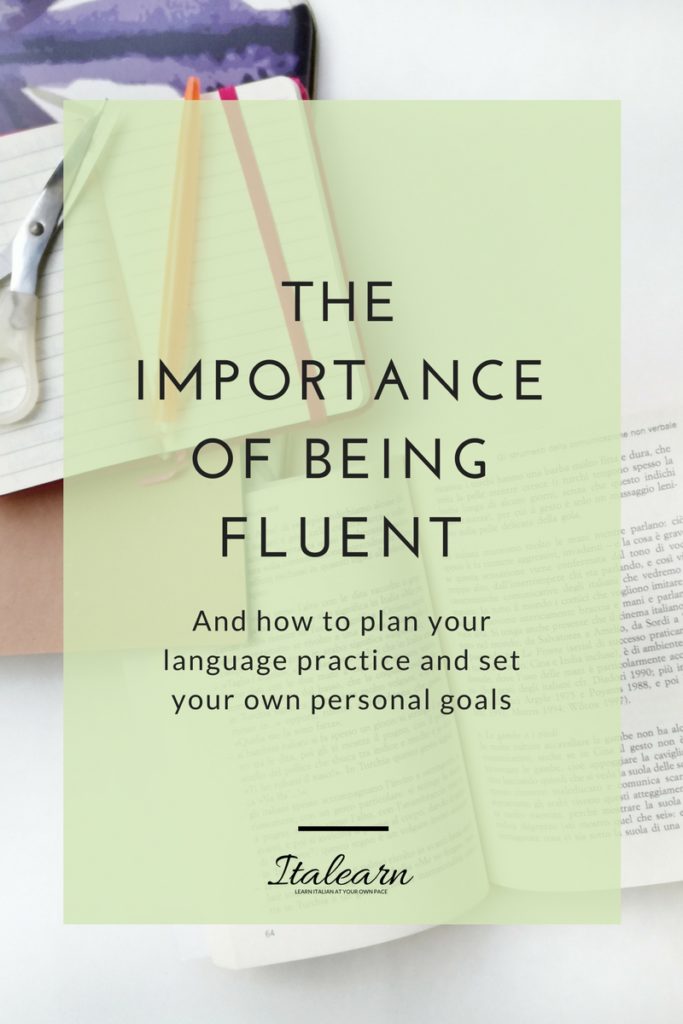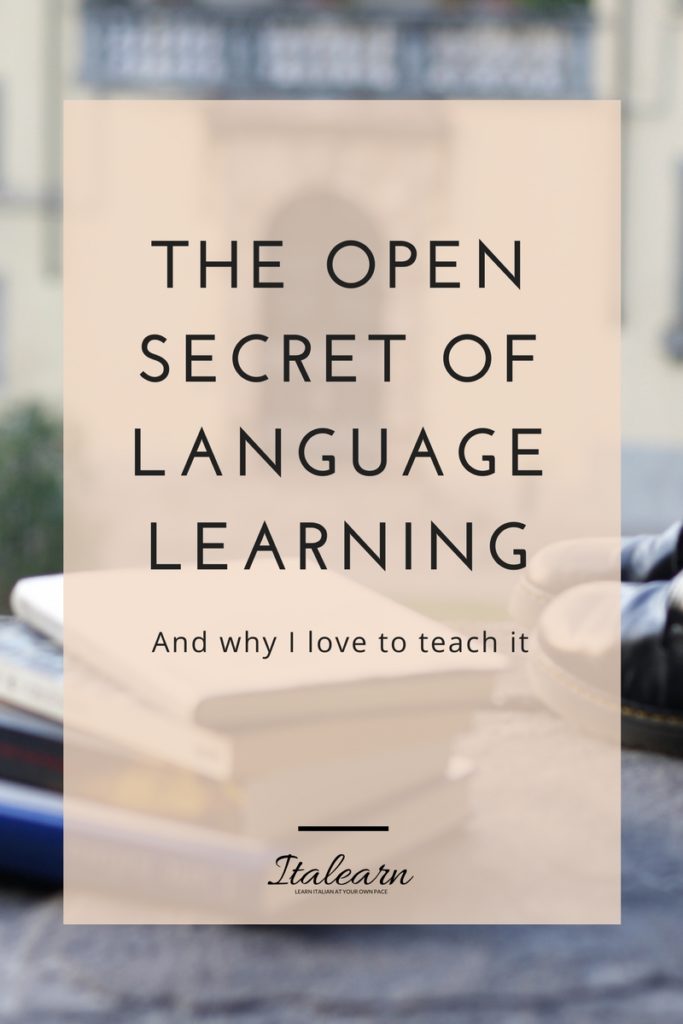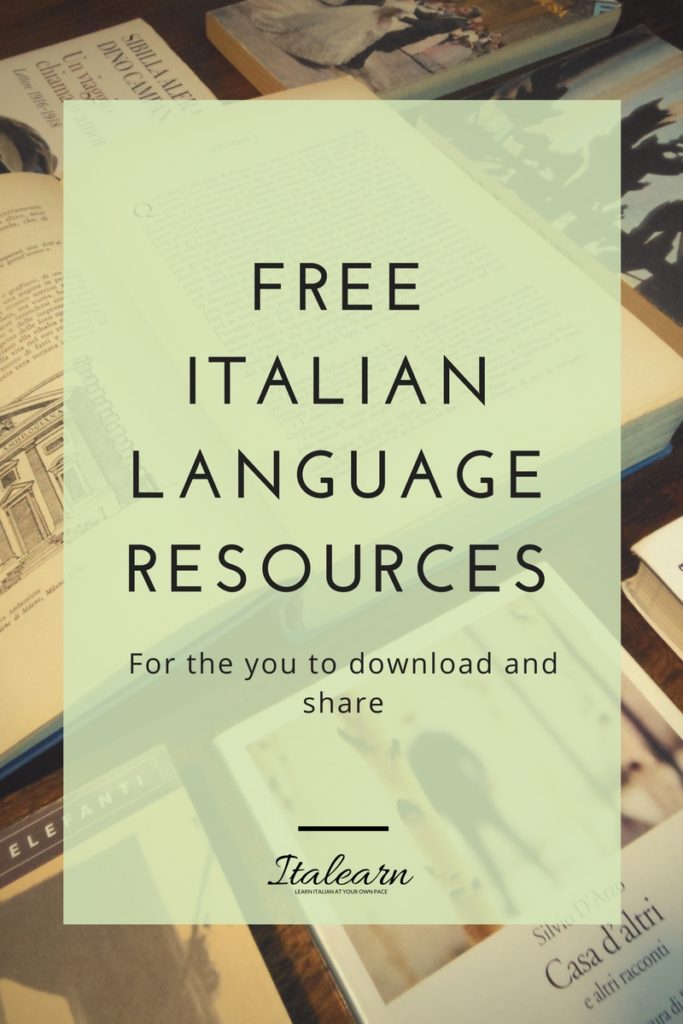How many apps, sites, courses you know of that promise to have you go from zero to fluency? Because fluency is the main goal of every language learner, no?
But what is fluency?
It’s a fluid concept – yes, I know there are probably synonyms that could fit better, but I really wanted to use fluid to describe fluency. It gives the idea of something that is not fixed and that does not conform to rigid rules or structures. There are some measurable parameters that you can use to test your fluency, but ultimately you are your own judge.
A definition of fluency
: the ability to speak easily and smoothly; especially : the ability to speak a foreign language easily and effectively
: the ability to do something in a way that seems very easy
This is the dictionary definition of fluency, which to a beginner ear sounds like: the ability I will never have.
Because, to be honest, for as much as we would like to speak fluently, there are so many things that get in the way: not enough time to study, not enough money to afford a school/course, not living in the country where they speak the target language, etc.
Our lives are already so packed with tasks, duties, relationships, problems, that is it worth it to struggle to become fluent in a foreign language?
My answer is yes, it is worth it to become fluent, but not to struggle for it. Mainly, because you are treating yourself by learning a language (unless you were forced to do it), and you should be savouring every little step forward you take, not unleashing your inner critic because you don’t feel fluent enough.
There isn’t a one-fits-all method or program to reach fluency, but rather many learning activities and habits that can help you be your own kind of fluent at each stage of your learning experience.
I do believe that fluency is not a general goal, it is personal. Maybe there will be a time when you’ll be able to say to yourself that you can finally speak easily and effectively in another language, but how you got there is a private learning experience that is different from anyone else.
What I usually recommend my students to do at the beginning of their language learning is to make it a regular practice and check in with themselves at fixed times. There are, of course, personal factors that they need to analyze, but there are also external factors that they should include in the analysis, for example:
- general/standardized parameters
- strategies
- planning
A framework for language learners
In Europe we have the “Common European Framework of reference for Languages” which is a tool that both students and teachers can use to determine the level of proficiency in spoken and written interaction – I use it too when I plan lessons or write courses.
What this framework does is giving an idea (sometimes even very precise) of what are the abilities that you should have at each stage of the “road to proficiency”.
For example, this is the description of the overall spoken interaction level of a beginner (A1 level):
can interact in a simple way but communication is totally dependent on repetition at a slower rate of speech, rephrasing and repair. Can ask and answer simple questions, initiate and respond to simple statements in areas of immediate need or on very familiar topics.
This is where we all start from when learning a new language. We can improve until we reach level C2:
has a good command of idiomatic expressions and colloquialisms with awareness of connotative levels of meaning. Can convey finer shades of meaning precisely by using, with reasonable accuracy, a wide range of modification devices. Can backtrack and restructure around a difficulty so smoothly the interlocutor is hardly aware of it.
If you ask me if it’s possible to go from A1 to C2 my answer is yes. But we cannot say with too much certainty how long it will take.
Of course teachers can predict the general evolution of a class, even though there will always be a brilliant student, some good ones, some meh, and one or two… hopeless.
However, working with adult, individual students is different. We all have different motivation, priorities, and goals and they all contribute to how and how fast you move between the proficiency levels. There is no final test at the end of my courses, no grades and no judgement, so you can set the degree of fluency that works for you in a specific moment.
Please don’t be mad at me for introducing too many technical concepts, my intention is to give you a framework, a structure of scientific information that somehow can explain how you feel at every stage of your learning.
Become a creative strategist
According to linguistics, we all have the innate capacity to acquire language, it happens naturally with the first one, our native, and it can happen again in the course of our life.
What interests us as adult learners of a foreign language is the possibility to make the learning process more effective and also efficient.
How can we do that? Our brain acquires new information in terms of creating new synapses.
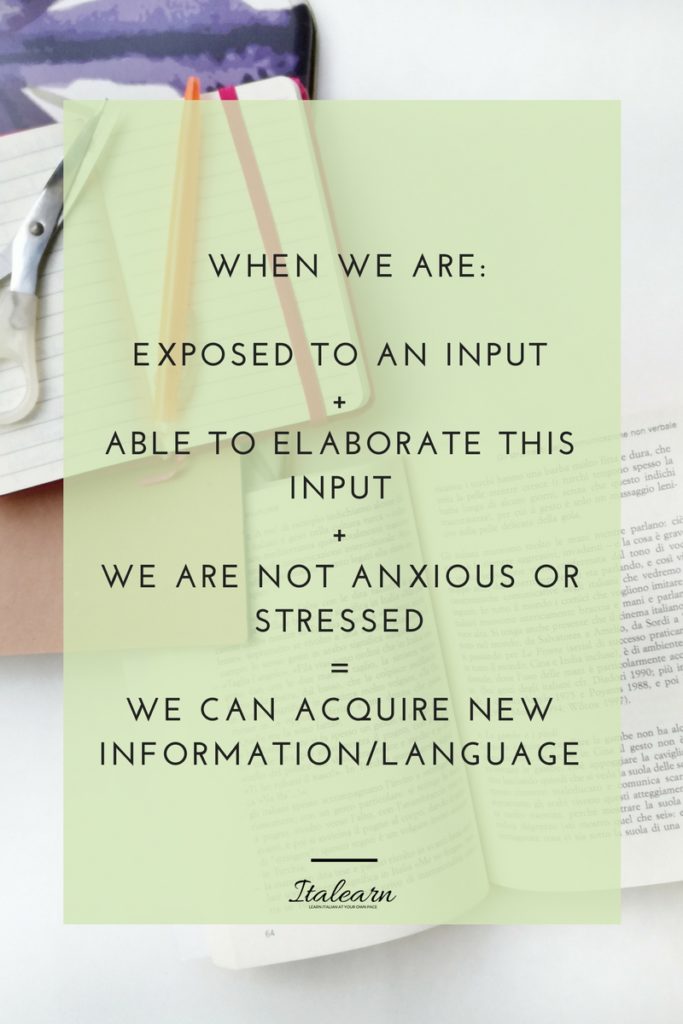

When we are exposed to an input, we are then able to elaborate this input, we are not anxious or stressed, we can acquire new information/language.
To this ideal environment we need to add one major factor that influences learning, motivation.
Our motivation is triggered by three elements: duty, need, pleasure. The first two fade pretty quickly, as soon as you don’t feel learning as a duty or as a need, but the last one, pleasure, is the one that will last longer and will keep your attention level always up.
So, just being exposed to an input is not enough, it won’t help fixating new information in your memory, unless… you make a conscious effort to memorize.
Learning new words by repeating them over and over is not a technique that will bring effective results. But if you link every new word to a specific experience (real of just evocative) you can be sure that the word will stay in your mind.
Then of course you can practice, for example you can record yourself so you can fix your pronunciation, you can write multiple sentences to cover all the shades of meaning, you can use it in a real conversation. You’ll find what works best for you.
What else can help us learn more effectively?
Being alert and attentive to the context of an interaction or written piece.
Listen to what happens around a phrase that you don’t understand, with lots of words you have never heard of before:
- Who is speaking?
- Where are they?
- What are the relationships between them?
- What do you already know?
- What can you infer from the non-verbal context?
You’ll be surprised at how much you understand before grabbing your phone and looking up unknown words.
There is so much more about communication than just the simple meaning of words.
Learn to listen before panicking because you think you don’t understand. Focus on the words and structures/patterns you already know, it will make your work easier.
If you are involved in a conversation, just ask the other speakers; or if you are watching a movie, find out as more information as possible about the plot, make connections to what has already been said; or if you are reading an article, make sure you know the general topic, use the context and only in a second moment use a dictionary.
These are just a few simple but effective techniques to help you making your language learning practice more efficient. When your learning strategies are in place, you become naturally more fluent, it will be gradually easier for you to add more new information, and you will develop your communication abilities further.
Use your creativity to find (or start from scratch) those techniques that will make your student life easier. Adapt standard exercises to your style, and dare.
Plan, plan, plan!
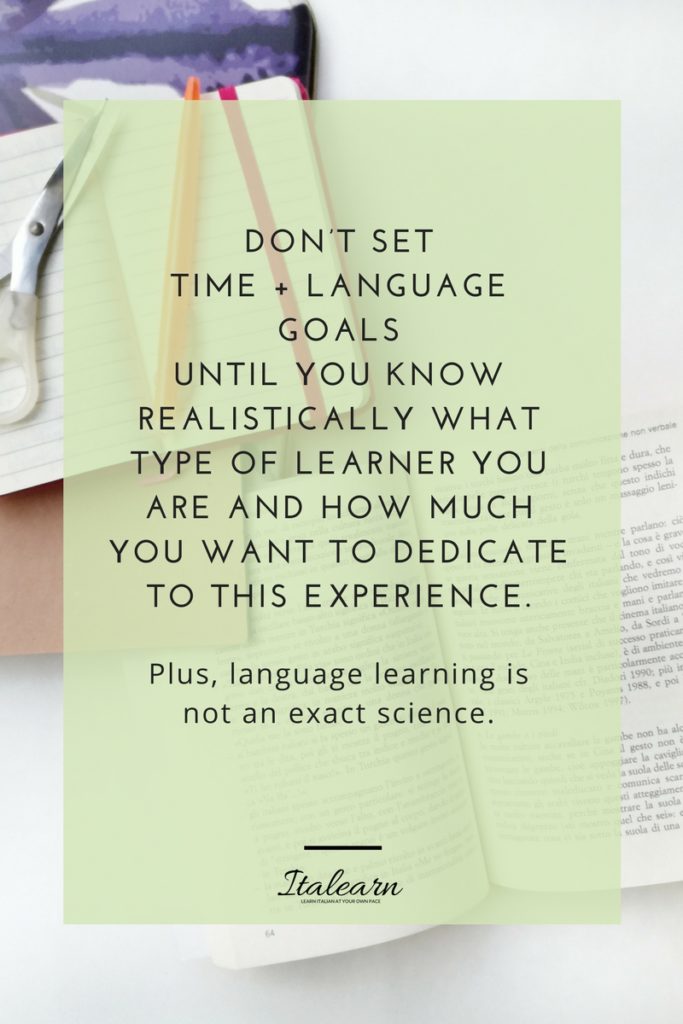

As an independent student you will have to take care personally of:
- Your goals = what you wish to be able to do with the language you acquire, what do you want to know/learn?
- How to accomplish them = what kind of lessons you want to take, which materials or resources do you need?
- Which strategies to use = what kind of exercises fits best your learning style, what are the techniques you prefer/know already work for you?
- When you want to study and how fast or slow you want to go = how much of your time to want to dedicate to Italian learning, do you have specific deadlines to meet?
- When you can say the goal is actually accomplished = are you able to establish if your initial goal has been met? Do you need to make adjustments?
Planning is your friend. A well planned learning experience will deliver better results faster, if you are in for it, of course.
The steps I have outlined above only have a meaning and a function if you know yourself:
- Are you a procrastinator or do you work diligently in the timeframe you have allowed for language practice?
- Are you easily bored sitting in front a computer reading and doing exercises or do you love to organize your learning materials to the tiniest detail?
- Do you have the will/determination to find time for Italian every day or would you rather study only on specific days/weeks/tmes?
Try to answer these questions and outline a realistic profile of you as a student. It is an important stage, that actually happens before you start, indeed it helps you to make better decisions, to stay more focused on your real needs and program the right routine for you.
Know your student self before committing to a schedule that is too tight for the energy and time you are able to give now.
Know your student self before deciding to take a certification x weeks from now.
Know your student self because if language learning can be predictable, you are you, not anyone else.
You cannot have the same goals of your best friend, you cannot learn at the same pace as your 3 year old child, but most of all: learning is a pleasure, not a race – against another person or against yourself.
You love reading but think you can’t read a story in Italian because you are a beginner? Think again.
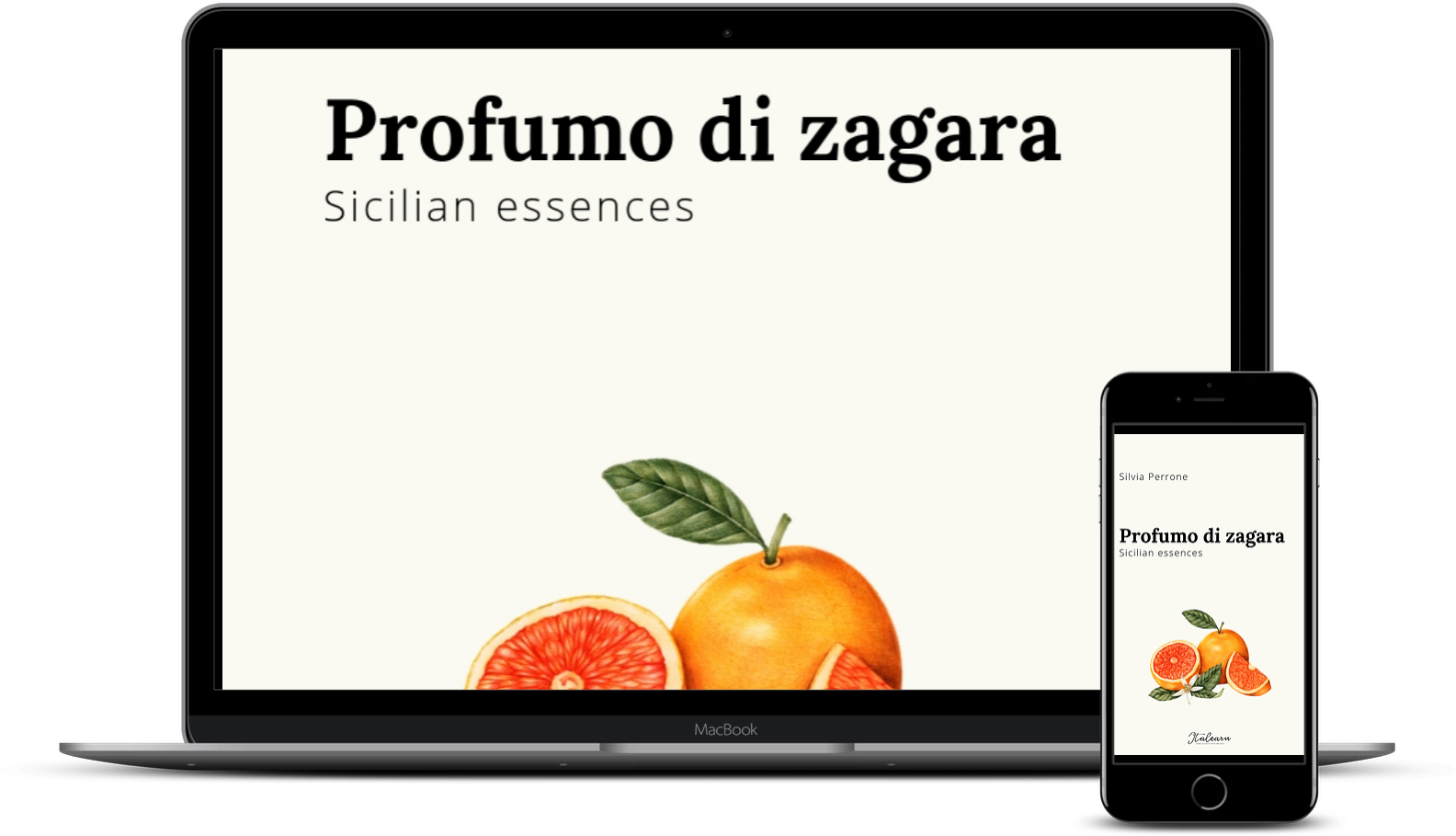

STORY+LESSON
Profumo di zagara is part of “The unconventional Italian Friday night”, a collection of short stories for beginner Italian learners. Enjoy reading even if you are just starting out with Italian. Each story comes in a “plain” version and a “full” version complete with vocabulary and grammar annotations. The audio book is also included so you can listen to the story and practice your pronunciation.
